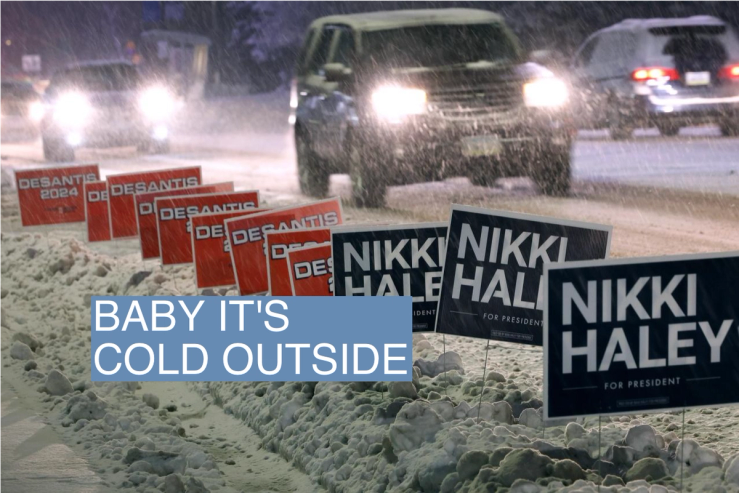The News
“Life-threatening winter weather” is expected to pummel Iowa on Friday, as the state looks toward Monday’s caucus when wind chills are projected to dip as low as negative 40 degrees. There has never been a colder Iowa caucus night than what’s forecast for Monday, per National Weather Service data. The 2024 Republican presidential hopefuls are increasingly concerned about the conditions, worried that the Arctic blast will suppress voter turnout.
Frigid temperatures and a snowstorm threw campaign schedules into chaos in the week before the caucus. GOP presidential contender Vivek Ramaswamy attacked other candidates for canceling their events due to the cold and snow, but eventually ended up canceling three of his own events due to the severe weather.
Some experts say that climate change is as much of a threat to elections and democracy as foreign interference, and a lack of robust plans to deal with extreme weather events could depress voter turnout and further marginalize underrepresented voices.
SIGNALS
Trump worries voters won’t show
Former president Donald Trump’s campaign was counting on a massive showing in Iowa, CNN reported, but his advisers are now trying to lower turnout expectations because of the cold. Members of the Trump team are concerned that his “hefty lead in the Iowa polls could deter some Trump supporters from showing up” on Monday, the outlet reported. During a campaign event in Sioux Center, Iowa, last week, Trump told the audience “the only way we are hurt” on Jan. 15 “is if you stay home.”
The whole GOP field is “publicly expressing optimism that their supporters will show up no matter how bad the weather is,” the Associated Press reported, despite the conditions already having wreaked havoc on their plans.
Failure to address climate change directly impacts voter turnout, experts says
Severe weather events – including winter weather – are exacerbated by climate change, and extreme weather prevents voters from making it to the polls, non-profit news outlet Prism reported in 2022. While extreme weather isn’t a form of voter suppression, experts warned that state legislatures resistant to climate change legislation combined with governors’ ill-prepared extreme weather response plans “create a scenario in which the electorate’s voice isn’t being heard.” Failing to address the root causes and effects of climate change on voting systems further risks marginalizing voices that are already underrepresented in elections, Prism wrote.
But a study of elections in India found that extreme conditions, especially those that affect the agricultural productivity of rural voters, can actually increase voter turnout by pushing voters to elect candidates with agricultural backgrounds, researchers wrote for The University of Chicago’s ProMarket publication.
State election officials need ‘robust’ extreme weather response plans
The frequency and intensity of natural disasters “is no less a grave risk” to democracy and elections than threats from foreign interference and artificial intelligence, according to policy analysis professor Quentin E. Hodgson. Election officials should be equipped to respond to “mega events” and not just small-scale disasters, he said.
One way is for U.S. governors and state officials to review and revise the emergency powers they can use after a disaster, including delaying an election day, expanding mail-in voting, or otherwise helping voters get to the polls. Congress could also get involved by allocating more disaster preparedness funding to states. Without “robust” extreme weather response plans, “disasters will likely depress voter turnout,” Hodgson wrote.



